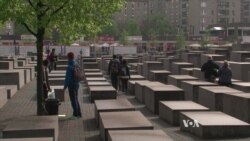ໄດ້ມີການຈັດ ພິທີສະຫຼອງ ຫລືຂີດໝາຍ ວັນຄົບຮອບ 70 ປີ ຂອງການສິ້ນສຸດລົງຂອງສົງຄາມໂລກຄັ້ງທີ 2 ຂຶ້ນໃນທຸກປະເທດໃນພາກພື້ນຢູໂຣບ ເມື່ອທ້າຍສັບປະດາທີ່ຜ່ານມາ ຄືໃນວັນທີ 8 ແລະ 9 ເດືອນພຶດສະພານີ້ ຍົກເວັ້ນ ຢູ່ໃນປະເທດ ເຢຍລະມັນ, ເຊິ່ງເປັນຜູ້ປະລາໄຊໃນສົງຄາມໂລກນັ້ນ. Al Pessin ນັກຂ່າວ VOA ໄດ້ໄປຢ້ຽມຢາມປະເທດ ເຢຍລະມັນ ເພື່ອລາຍງານຂໍ້ຄິດເຫັນ ກ່ຽວກັບ ສົງຄາມ ແລະ ຜົນກະທົບທີ່ຍັງມີຢູ່ຂອງມັນ ເຊິ່ງພຸດທະສອນ ຈະນຳມາສະເໜີທ່ານ ໃນອັນດັບຕໍ່ໄປ.
ເບິ່ງວີດິໂອ ພາສາລາວ:
ອະນຸສອນສະຖານອັນກວ້າງໃຫຍ່ ທີ່ມີລັກສະນະຄືກັນກັບເປັນປ່າຊ້າ ມີໂຮງສົບຫີນ ຢາຍລຽງກັນຢູ່ ສ້າງຂຶ້ນມາເພື່ອລະລຶກເຖິງ ຊາວຢິວຈຳນວນ 6 ລ້ານຄົນ ທີ່ຖືກຂ້າຕາຍ
ໂດຍພວກນາຊີ ແມ່ນກວມເນຶ້ອທີ່ ບໍລິເວນກວ້າງຂວາງໃນໃ ກາງນະຄອນ ເບີລິນ. ມັນຖືກ
ສ້າງຂຶ້ນພຽງເມື່ອ 10 ປີກ່ອນ ທ່າມກາງຄວາມຂັດແຍ່ງກັນຢ່າງໃຫຍ່ຫຼວງ ແມ່ນແຕ່ໃນເວລານັ້ນ. ຫ່າງອອກໄປ 200 ແມັດ, ເຊິ່ງມີຕົ້ນໄມ້ບັງຢູ່ນັ້ນ, ແມ່ນປ້ອມຫຼົບໄພ ທີ່ Adolf Hitler ໃຊ້ເພື່ອອອກຄຳສັ່ງບັນຊາສົງຄາມ, ແລະ ເຊື່ອວ່າເປັນບ່ອນທີ່ລາວຂ້າໂຕຕາຍ.
ຕອນນີ້ ບໍລິເວນດັ່ງກ່າວໄດ້ກາຍມາເປັນບ່ອນຈອດລົດ ທີ່ບໍ່ມີຫຍັງເຫຼືອໃຫ້ເຫັນ ອີກແລ້ວ, ແຕ່ສຳລັບນາງ Tina ນັກທ່ອງທ່ຽວຈາກປະເທດອັງກິດ, ບົດຮຽນ ແມ່ນຍັງຄົງເຫຼືອຢູ່ຄືເກົ່າ.
ນາງ Tina ກ່າວວ່າ “ແມ່ນກະທັ້ງມື້ນີ້, ໃນປະເທດຂອງເຮົາເອງ, ກໍຍັງມີກຸ່ມພວກ
ຫົວຮຸນແຮງ ໂຜ່ໂຕຂື້ນມາຢູ່. ແລະ ຂ້ອຍກໍ່ກຳລັງຄິດວ່າ ຖ້າພວກເຮົາ ຄົນທີ່ດີໆ
ທຳມະດາສາມັນບໍ່ພາກັນເຮັດຫຍັງແລ້ວ, ມັນກໍ່ຈະມີໂອກາດວ່າປະຫວັດສາດ
ຈະຊ້ຳຮອຍມັນເອງ.”
ແລະ ນັ້ນກໍ່ແມ່ນຂໍ້ຄວາມທີ່ແນໃສ່ຊາວເບີລິນ ຜ່ານທາງ ວິດີໂອ ແລະ ຮູບພາບທີ່ນຳອອກ
ສາຍ ແລະ ວາງສະແດງ ຢູ່ໃນຫຼາຍໆເຂດຂອງເມືອງ ເຊິ່ງເທື່ອໜຶ່ງເຄີຍຖືກແບ່ງອອກເປັນສອງຝ່າຍນັ້ນ.
ທ່ານ Bjoern Weigel ແມ່ນຜູ້ກຳກັບດູແລ ອະນຸສອນະຖານແຫ່ງນີ້.
ທ່ານ Weigel ກ່າວວ່າ “ບ່ອນນີ້ແມ່ນໂຕແທນຂອງ 70 ປີກ່ອນ, ແຕ່ວ່າໃນ
ພາກສ່ວນອື່ນໆຂອງໂລກ, ແລະ ແມ່ນແຕ່ໃນພາກສ່ວນອື່ນໆຂອງຢູໂຣບ,
ມັນແມ່ນຊີວິດ ປະຈຳວັນ”
ບັນດານັກທ່ອງທ່ຽວຊາວຢູໂຣບ ທີ່ໄປທ່ຽວນະຄອນ ເບີລິນ ເຂົ້າໃຈດີເຖິງເນື້ອໃນຈິດໃຈ ຂອງອະນຸສອນສະຖານແຫ່ງນີ້ ເພາະວ່າພວກເຂົາເຈົ້າຮູ້ດີວ່າ ເດືອນພຶດສະພາ ປີ 1945 ນັ້ນ ບໍ່ແມ່ນວັນສິ້ນສຸດລົງ ຂອງບັນຫາຕ່າງໆຂອງທະວີບ.
ທ້າວ Julian ນັກສຶກສາຈາກໂປແລນ ກ່າວວ່າ “ສຳລັບພວກເຮົາ, ຄົນໂປແລນ,
ມັນໝາຍເຖິງວັນອາວະສານຂອງການທຳລາຍປະເທດຂອງພວກເຮົາ, ແຕ່ວ່າ
ໃນຕອນນັ້ນ ພວກເຮົາຢູ່ໃຕ້ການຄວບຄຸມຂອງໂຊວຽດ, ດັ່ງນັ້ນ ມັນກໍ່ບໍ່ຄ່ອຍມີ
ຄວາມໝາຍກັບເຮົາຫຼາຍປານໃດ. ແຕ່ພວກເຮົາກໍ່ສະເຫຼີມສະຫຼອງ ຢູ່ດີ.”
Frank ນາຍຄູຈາກຝຣັ່ງ ກ່າວວ່າ “ພວກເຮົາບໍ່ຮູ້ວ່າ ຈະມີຫຍັງເກີດຂຶ້ນ ຖ້າວ່າ
ມັນບໍ່ເປັນໄປແນວນັ້ນ. ບາງເທື່ອ ມັນອາດຈະມີອີກໂລກໜຶ່ງຢູ່ນີ້, ໃນເຢຍລະ
ມັນ, ໃນຝຣັ່ງ, ໃນທົ່ວຢູໂຣບ.”
Gerd Appenzeller ເປັນສະມາຊິກກອງບັນນາທິການຂອງ ໜັງສືພິມ Tagegesspeigel ຂອງ ເບີລິນ ແລະເຄີຍເປັນຜູ້ຈັດພິມໜັງສືພິມສະບັບນີ້.
ທ່ານ Appenzeller ກ່າວວ່າ “ສຳລັບຄົນເຢຍລະມັນ, ແລະ ສຳລັບຂ້ອຍເອງ,
ມັນເປັນມື້ໜຶ່ງທີ່ຈະບໍ່ມີວັນລືມໄດ້… ບໍ່ສາມາດທີ່ຈະລືມໄດ້.”
ທ່ານ Appenzeller ເປັນຫ່ວງວ່າ ຄວາມເປັນພາຄີກັນຫຼັງສົງຄາມຂອງບັນດາ ປະເທດ ທີ່ໄດ້ຊ່ວຍເຮັດໃຫ້ເຢຍລະມັນປອດໄພ ແລະ ຮວມຕົວກັນໃໝ່ນັ້ນ ກຳລັງຈະປ່ຽນແປງໄປ ໃນຂະນະທີ່ປະເທດ ຣັດເຊຍ ເອົາບົດບາດຢືນຢັນອຳນາດຂອງຕົນຫຼາຍຂຶ້ນ ແລະ ຄົນ
ເຢຍລະມັນລຸ້ນໃໝ່ຖືວ່າ ສັນຕິພາບເປັນສິ່ງທີ່ພວກເຂົາສົມຄວນຕ້ອງມີ.
ທ່ານ Appenzeller ກ່າວວ່າ “ຄົນເຮົາສ່ວນໃຫຍ່ແມ່ນຮູ້ສຶກເພິງພໍໃຈກັບ
ເສລີພາບ. ພວກເຂົາບໍ່ຄິດຫຼືໃສ່ໃຈເລີຍ ກັບຂໍ້ເທັດຈິງວ່າ ເສລີພາບນີ້ແມ່ນ
ຕົກ ຢູ່ໃນອັນຕະລາຍຢ່າງຕໍ່ເນື່ອງ. ປະເທດອາເມຣິກາ ກຳລັງປ່ຽນແປງໄປ,
ສາຍພົວພັນທົ່ວໂລກກໍ່ກຳລັງມີການປ່ຽນແປງ, ແລະ ຄົນເຢຍລະມັນທັງ
ຫຼາຍ ກັບ ຄົນຢູໂຣບ ກໍ່ຕ້ອງມາໂຮມກັນ, ແລະ ຢູ່ນຳກັນ, ເພື່ອສືບຕໍ່ເປັນ
ຄູ່ຮ່ວມມືທີ່ສຳຄັນ ສຳລັບ ສະຫະລັດ ອາເມຣິກາ.”
ສະຖານທູດ ສະຫະລັດແຫ່ງໃໝ່ ໃນກຸງເບີລິນ ເບິ່ງຄືວ່າຈະເນັ້ນເຖິງຄວາມ ເປັນພັນທະມິດ
ດັ່ງກ່າວນັ້ນ. ມັນຖືກສ້າງຢູ່ຕິດກັບປະຕູໂຂງ Brandenberng, ເຊິ່ງເປັນໜຶ່ງໃນສັນຍາລັກ
ແຫ່ງຊາດຂອງເຢຍລະມັນ, ແລະ ຄັ້ງໜຶ່ງເຄີຍເປັນສັນຍາລັກຂອງເສັ້ນແບ່ງແຍກ ລະຫວ່າງ ເຢຍລະມັນຕາເວັນອອກ ແລະຕາເວັນຕົກ.
The 70th anniversary of the end of World War Two will be marked in all European countries (this) next week (Eds. May 8 and 9), except Germany, which lost the war. VOA's Al Pessin visited Berlin to report on how the war is viewed and the impact it is still having.]]
((NARRATOR))
The stark and extensive memorial to the six million Jews killed by the Nazis takes up a large area in central Berlin. It was built just 10 years ago, even then amid considerable controversy. Two hundred meters away, behind those trees, sat the bunker where Adolf Hitler directed the war effort, and is believed to have committed suicide.
There is nothing left now under this parking lot, but for visitors like Tina from Britain, the lessons remain.
((TINA, RETIRED JOURNALIST FROM BRITAIN))
"Even today, in our own country, there are extremist groups cropping up. And I am thinking that if ordinary, decent people do not do anything, there is always a chance of history repeating itself."
((NARRATOR))
And that is the message aimed at Berliners through a video and photo exhibit on display in several parts of this once-divided city.
Bjoern Weigel is the curator.
((BJOERN WEIGEL, EXHIBIT CURATOR))
"This was 70 years ago, but in other parts of the world, and even in other parts of Europe, this is everyday life."
((NARRATOR))
The theme is not lost on Europeans visiting Berlin, who know well that May 1945 was not the end of the continent's troubles.
((JULIAN, STUDENT FROM POLAND (man in English) ))
"For us, for Polish people, it means the end of destroying of our country, but we were controlled by Soviets, so it is not very meaningful for us. But we celebrate it."
((FRANK, TEACHER FROM FRANCE (man in English) ))
"We do not know what would be happening if it had not gone like that. Maybe (there would be) another world here, in Germany, in France, in all of Europe."
((GERD APPENZELLER, FORMER PUBLISHER, TAGEGESSPIEGEL NEWSPAPER (in German) ))
"For Germans, and for me, it is a day that will not be forgotten, that cannot be forgotten."
((NARRATOR))
Gerd Appenzeller is a member of the editorial board at Berlin's Tagesspeigel Newspaper, and its former publisher. He worries that the post-War alliances that secured and reunited Germany are shifting, just as Russia is becoming more assertive and a new generation of Germans is taking peace for granted.
((GERD APPENZELLER, FORMER PUBLISHER, TAGEGESSPIEGEL NEWSPAPER (in German) ))
"The vast majority have gotten comfortable with freedom. They give little thought to the fact that this freedom is constantly in danger. America is changing, global relations are changing, and the Germans and Europeans have to unite, and stay together, just to remain a relevant partner for the United States."
((NARRATOR))
The new U.S. embassy in Berlin seems to underscore that partnership, standing right next to the Brandenburg Gate, one of Germany's national symbols, and once a symbol of the East-West divide. ((AL PESSIN, VOA NEWS, BERLIN))







